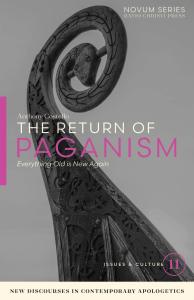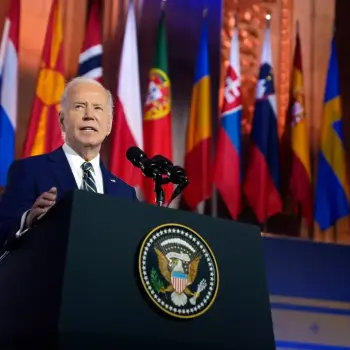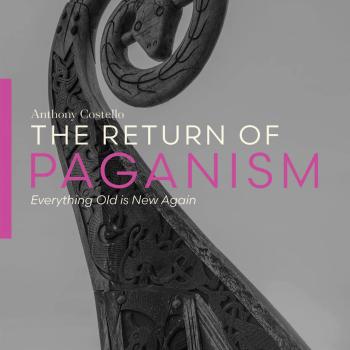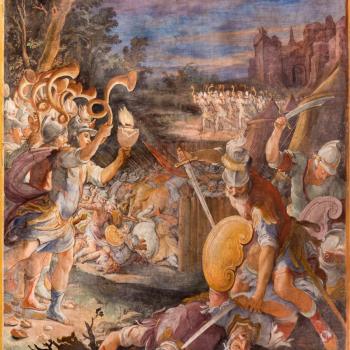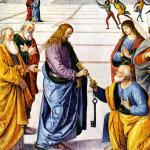Roughly three and a half years ago I started writing for Patheos. Around that time, I was reading quite a few academic articles on Critical Race Theory. One of the articles I came across, which I highlighted in this two-part series, opened my eyes to something I had not expected, namely, that there was an organic connection between Critical Race Theory, as well as Queer Theory, and paganism.
That article, published in July 2021, was called “CRT And The Return of the Old Gods.” It highlighted how the attack on what critical race theorists call “Whiteness” was, at bottom, an attack on the entire biblical concept of God. In short, the Judeo-Christian idea that God is not immanent in the world, but that God is transcendent–metaphysically speaking–and separate from His creation was anathema to many critical theorists. The term this idea went under was “desacralization.” “Desacralization” is the idea that “white” religion didn’t emphasize the divinity of nature, meaning that “white” religion “left no room for the operation of sacred forces” in the world (see Kenneth Nunn, “Law as Eurocentric Enterprise”).
The fact that this kind of mystical language was in an article published in a legal journal was eye-opening. Moreover, the idea that God is not a part of His creation is hardly “white,” unless by “white” one really means “Judaic” and “Christian.”
Could Paganism Really Make a Come-Back?
For me, this made the possibility of a return of Paganism in the West, a return many thought could never happen, quite plausible. After all, if the entire Judeo-Christian foundation upon which Western law and governance needed to be radically uprooted, upon what other foundation might our institutions be rebuilt? Moreover, if human beings are inherently spiritual, i.e., more homo religiosus than homo politicus, then whatever alternative for the rebuilding of so-called “white” institutions and systems critical theorists might invoke, it would likely itself be religious.
A sort of pure secularism had reached its academic heyday in the 1950’s with the Logical Positivists, and had gasped its last breath with the New Atheists in the early 2000’s. But that kind of scientistic atheism was on the wane, and, at this point, as dead as its own conception of matter. The new alternative to theistic belief, especially Christian theism, was not some sterile, atheistic rationalism. The new alternative was new-age pantheism and its natural counterpart: pagan spirituality.
For example, that all of the founding “mothers” of Black Lives Matter are not only “trained Marxists” but also active practitioners of African folk religion, manifested this new, spiritual shift in the political culture. The scions of social justice were no longer Christian ministers– liberal theologians of the Ritschlian school carrying out the social Gospel of Rauschenbusch or the liberation theology of Cone. Nor were they reluctant political existentialists like Sartre or Andre Gide. The new Left was deeply religious, and overtly pagan. Could it be then that Paganism, the old religion, was reemerging as the new basis for political enterprise?
Of course, this was only one strain of paganism that I had stumbled across. Little did I know that as I further researched the idea of a reemerging Paganism, I would find myself drowning in a sea of evidence from a wide variety of sources: political, economic, scientific, pedagogic, and, perhaps most obviously, the world of entertainment. One of the books I would recommend to any Christian who thinks this is overblown alarmism, or some updated “Satanic Panic,” is Carl Teichrib’s incredible journalist accounting of the rising new-age Paganism “Game of Gods.” Indeed, my hunch was correct, and now, as I find more and more Christian authors pointing out the same, I have been motivated to write a short book on the subject: “The Return of Paganism,” published by Ratio Christi Press.
The Return Of Paganism
Some excerpts from the eBook:
Renowned Catholic thinker, G. K. Chesterton, summarized the history of religion in a single sentence: “Paganism was the biggest thing in the world, and Christianity was bigger, and everything since has been comparatively small.” Could it be that paganism is about to get big again? If so, the need to understand it is also great, especially from a Christian perspective. Christianity and paganism are closer relatives than Christianity and atheism, but their family resemblance is skin deep, and their relationship more rivalry than reunion. Where and how paganism and orthodox Christianity align and diverge is becoming critical for the Church to recognize. But the task is not as easy as one would think. It’s time to take a closer look. (3)
In The Abolition of Man, C. S. Lewis wrote of respecting the pagan impulse. “To respect” means to look seriously at and properly grasp the object of intellectual engagement. We’ve attempted that here. The great Christian authors of the past century: Lewis, Tolkien, Eliot, Chesterton, and MacDonald, all respected paganism. They saw the desire for connection, for mystery, for adventure, and for an experience of the divine through nature. They shared misgivings about reducing ourselves and our societies to mere mechanisms, objects capable of and vulnerable to political and economic exploitation and control. Through their own myths (Lord of the Rings, Chronicles of Narnia) they warned about technology and its potential affects on our humanity. These desires and misgivings are common to both the modern Christian and neopagan. (19)
To get your copy of the new Ebook, just click here.
